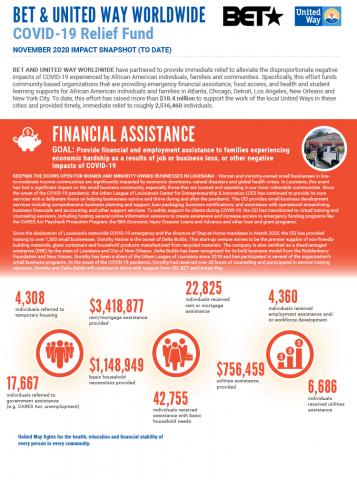
Cross-Cutting Strategies – Providing Just-in-time Supports
Cross-Cutting Strategies and Examples
Throughout this guide we have outlined strategies and approaches designed to make important progress in childhood and youth success, economic mobility, and health. Creating sustainable changes that address persistent systemic issues also requires comprehensive and integrated approaches that span impact areas. Examples range from leveraging national partnerships in providing just-in-time resources, to longer term strategies for eliminating the drivers of systemic inequality. The goal is to pair effective strategies in specific impact areas with thorough cross-sector partnerships and collaboration that can potentially achieve broader, lasting change.
Fundraising, Resource Allocation and Grantmaking - Being Responsive to Community Needs Through Collaboration and Just-in-Time Supports
UWW AND BET COVID-19 Relief Efforts Disasters, both human and weather related, are an unfortunate fact of life. United Ways must cement the value of their historical relevance as the go-to resource for short term assistance with emergency needs. This means relying on strong relationships with agency partners established prior to disasters when victims look to the organization for dependable, trusted assistance. COVID-19 reporting has highlighted the disproportionate health, education, and economic impact on BIPOC communities.51 This reflected, in large part, on long standing racial disparities compounded across resources limited access to health, education, and economic mobility. In response, United Way Worldwide partnered with BET Networks in April 2020 to introduce the COVID-19 Relief Efforts initiative.
This United Way Worldwide collaboration with BET was initiated to provide needed relief in the African American community by alleviating some of the negative health, economic, and educational effects exposed by the COVID-19 pandemic. Resources funded community-based organizations providing emergency financial assistance, and access to food and health clinics. Student-learning and family supports were established in six major U.S. cities: Atlanta, Chicago, Detroit, Los Angeles, New Orleans and New York City. Relief was provided in the form of rent, mortgage and utility assistance. Internet access, including computer hardware/software, and other learning supports were provided to keep students engaged while learning at home. Food assistance in the form of pantries, soup kitchens and meal kits ensured that families had access to nutritious meals. Health assistance provided families access to primary and preventative health care. To date this joint effort has raised over $18.4 million in support of these six cities. Critical relief was distributed to over 2.5 million people.
By cultivating and leveraging relationships, these United Ways were able to effectively engage and mobilize in response to the pandemic. They have each gained priceless credibility by not allowing the impacts of racial inequity exposed by the pandemic to go unchallenged. The United Way Network partnered with community and national organizations to mobilize a real time response to meet critical resident needs. Credibility earned in times of crises positions United Way as a trustworthy community partner responsive to the particular needs of BIPOC communities.




